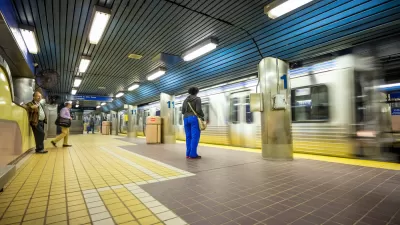President Obama signs executive order to end SEPTA transit strike, establishes emergency labor mediation board in response to Governor Corbett's request.

"Striking SEPTA railroad workers had erected pickets early Saturday, surprising travelers who found themselves without train service," writes Jonathan Lai, for The Inquirer, unfolding the events over the weekend in Philadelphia with regard to SEPTA regional transit, which services 126,000 trips on a typical weekday.
"Gov. Corbett [requested] a presidential emergency board to mediate the labor dispute and compel the striking rail engineers and electrical workers to return to work for 240 days." The official response makes the case for the tens of thousands of daily transit riders: "It is imperative that parties continue to work toward an agreement for the benefit of the tens of thousands of people who use SEPTA rail every day...I call on both parties to work together, find common ground and place the riders at the forefront of mind in their discussions.” reads Governor Tom Corbett’s statement.
Lai summarizes the union's position: "the railroad workers have two major objections to the SEPTA offer: They want the raises to be retroactive to the expiration of their last contracts, and they want an additional 3 percent raise, which they say represents the value of a pension benefit increase."
"Neither side in the labor dispute was overjoyed by what they saw as a temporary solution to a years-long battle. Management and labor both said they thought another strike is likely in February, when the 240-day period expires."
"'That's the worst possible time for a strike,’ Union Boss Stephen Bruno said, 'with everybody in school and 72 inches of snow on the ground.'" In November, President Obama appointed an emergency board to help resolve a dispute between the Long Island Rail Road and unions, where sides yet to reach agreement.
FULL STORY: Obama signs order; SEPTA Regional Rails to roll Sunday

Alabama: Trump Terminates Settlements for Black Communities Harmed By Raw Sewage
Trump deemed the landmark civil rights agreement “illegal DEI and environmental justice policy.”

Study: Maui’s Plan to Convert Vacation Rentals to Long-Term Housing Could Cause Nearly $1 Billion Economic Loss
The plan would reduce visitor accommodation by 25% resulting in 1,900 jobs lost.

Why Should We Subsidize Public Transportation?
Many public transit agencies face financial stress due to rising costs, declining fare revenue, and declining subsidies. Transit advocates must provide a strong business case for increasing public transit funding.

Paris Bike Boom Leads to Steep Drop in Air Pollution
The French city’s air quality has improved dramatically in the past 20 years, coinciding with a growth in cycling.

Why Housing Costs More to Build in California Than in Texas
Hard costs like labor and materials combined with ‘soft’ costs such as permitting make building in the San Francisco Bay Area almost three times as costly as in Texas cities.

San Diego County Sees a Rise in Urban Coyotes
San Diego County experiences a rise in urban coyotes, as sightings become prevalent throughout its urban neighbourhoods and surrounding areas.
Urban Design for Planners 1: Software Tools
This six-course series explores essential urban design concepts using open source software and equips planners with the tools they need to participate fully in the urban design process.
Planning for Universal Design
Learn the tools for implementing Universal Design in planning regulations.
Smith Gee Studio
Alamo Area Metropolitan Planning Organization
City of Santa Clarita
Institute for Housing and Urban Development Studies (IHS)
City of Grandview
Harvard GSD Executive Education
Toledo-Lucas County Plan Commissions
Salt Lake City
NYU Wagner Graduate School of Public Service




























